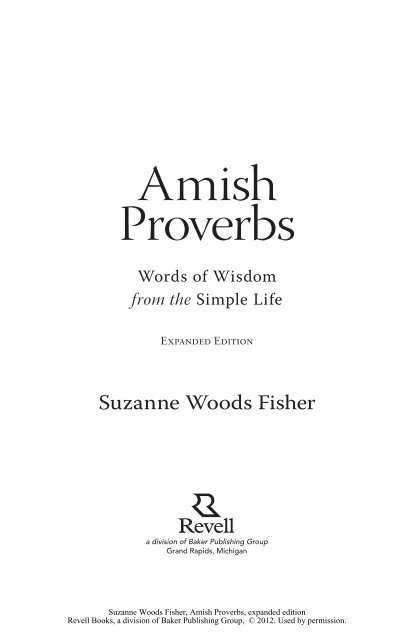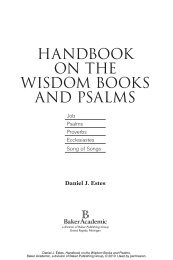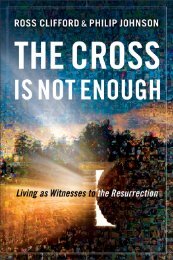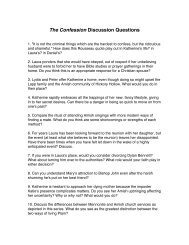Amish Proverbs - Baker Publishing Group
Amish Proverbs - Baker Publishing Group
Amish Proverbs - Baker Publishing Group
Create successful ePaper yourself
Turn your PDF publications into a flip-book with our unique Google optimized e-Paper software.
To my mother, Barbara Benedict Woods,who raised her childrenon Pennsylvania Dutch sayings.This one is her favorite:“Every mother crow thinks her own little crow is the blackest.”Suzanne Woods Fisher, <strong>Amish</strong> <strong>Proverbs</strong>, expanded editionRevell Books, a division of <strong>Baker</strong> <strong>Publishing</strong> <strong>Group</strong>, © 2012. Used by permission.
AcknowledgmentsThese collections are drawn, with permission, from a varietyof sources: The Sugarcreek Budget, <strong>Proverbs</strong> of the PennsylvaniaGermans by Dr. Edwin Miller Fogel, the PennsylvaniaGerman Dictionary by C. Richard Beam, and the sayings and adagesI grew up hearing from my grandfather’s Old Order GermanBaptist Brethren family.My grandfather—we called him Deardad—was famous forpointing out to me with a frown that “young folks should usetheir ears and not their mouths.”Another saying I grew up hearing was, “Choose your love andlove your choice.” That one belongs to my mother.9Suzanne Woods Fisher, <strong>Amish</strong> <strong>Proverbs</strong>, expanded editionRevell Books, a division of <strong>Baker</strong> <strong>Publishing</strong> <strong>Group</strong>, © 2012. Used by permission.
Suzanne Woods Fisher, <strong>Amish</strong> <strong>Proverbs</strong>, expanded editionRevell Books, a division of <strong>Baker</strong> <strong>Publishing</strong> <strong>Group</strong>, © 2012. Used by permission.
IntroductionThe <strong>Amish</strong> in Their Own WordsMost every culture has proverbs that are unique to it.Whether called maxims, bromides, truisms, idioms,expressions, sayings, or just an old saw, proverbs aresmall, concentrated packages that let us peek into the window of apeople’s values and beliefs. They give us insight into a culture, itsfaith, folklore, history, language, mentality, psychology, worldview,and values. These pithy sayings are not meant to be universal truths.They contain general observations and experiences of humankind,including life’s multifaceted contradictions.“<strong>Proverbs</strong>,” radio Bible teacher J. Vernon McGee once said, “areshort sentences drawn from long experience.” 1The ancient Eastern world—Egypt, Greece, China, and India—is thought to be the home of proverbs, dating back to collectionsfrom as early as 2500 BC. King Solomon, who reigned in the tenthcentury BC, gathered many of them from other sources as well asedited and authored others. Over five hundred were compiled into11Suzanne Woods Fisher, <strong>Amish</strong> <strong>Proverbs</strong>, expanded editionRevell Books, a division of <strong>Baker</strong> <strong>Publishing</strong> <strong>Group</strong>, © 2012. Used by permission.
Introductionthe book of <strong>Proverbs</strong> in the Bible. <strong>Proverbs</strong> were used in monasteriesto teach novices Latin. Often colorfully phrased, at times evenmusical in pronunciation, proverbs served as teaching tools forilliterate populations that relied on oral tradition.Interestingly, the proverbs have played a surprisingly prominentrole in the speech of the Pennsylvania Germans, which includes—thoughisn’t limited to—the <strong>Amish</strong>. “It is natural that thePennsylvania Germans should use the proverb extensively,” writesDr. Edwin Miller Fogel in his book <strong>Proverbs</strong> of the PennsylvaniaGermans, “because of the fondness of the Germanic peoples forthis form of expression. The proverbs are the very bone and sinewof the dialect.” 2“The ones that are common in the community are most likely inthe oral tradition,” says Dr. Donald B. Kraybill, senior fellow at theYoung Center for Anabaptist and Pietist Studies at ElizabethtownCollege, Pennsylvania. “Not particularly <strong>Amish</strong>, but part of thebroader rural tradition of the area.” 3The Pennsylvania Deitsch dialect (which is called “Penn Dutch,”though it has no relationship to Holland) originated in the Palatinatearea of Germany over four hundred years ago and was broughtto Pennsylvania in the 1700s with a wave of immigrants: Lutherans,Mennonites, Moravians, <strong>Amish</strong>, German Brethren, and GermanReformed. Penn Dutch was, and is, an oral language; even today,people from different states can understand one another since thelanguage has remained close to its origins.“Most of what they [German immigrants] knew, they broughthere from the Old World,” explains C. Richard Beam, retired fullprofessor of German at Millersville University. “The proverbs werean integral part of Pennsylvania German culture. The further backyou go, the richer the language.”12Suzanne Woods Fisher, <strong>Amish</strong> <strong>Proverbs</strong>, expanded editionRevell Books, a division of <strong>Baker</strong> <strong>Publishing</strong> <strong>Group</strong>, © 2012. Used by permission.
Introductionletter, and then it just caught on. Now, almost all of the letters haveone. Early on, letters didn’t include them. Mostly, they’re sayingsthat pass from generation to generation. The proverbs are veryrelevant. They can speak to you. They can hit you.”The proverbs in this book, like all proverbs, come from manysources—most of them anonymous and all of them difficult totrace. It is not unusual to find the same proverb in many variants.The saying “Bend the tree while it is young; when it is old,it is too late” is a variation on the Bible’s “Train up a child in theway he should go: and when he is old, he will not depart from it”(Prov. 22:6 KJV).God plays a prominent role in <strong>Amish</strong> proverbs, as does nature:weather and seasons, agriculture and animals. In our modern world,the rural savvy may seem outdated. But look a little deeper. Theproverbs are every bit as relevant in the year 2012 as they were in1712: Der alt Bull blarrt als noch means “The old bull keeps onbellowing,” or to give it a twenty-first-century twist, “The oldscandal will not die down.”These sayings and proverbs, dear to the <strong>Amish</strong>, can help theEnglish (non-<strong>Amish</strong>) better understand them. For example, hereare two proverbs that reveal how the <strong>Amish</strong> value the virtue ofpatience: “Only when a squirrel buries and forgets an acorn cana new oak tree come forth,” and “Adopt the pace of nature; hersecret is patience.”<strong>Proverbs</strong> are just as useful in our life today as they are to OldOrder <strong>Amish</strong> families. They’re just as relevant to us as they wereto the Israelites in King Solomon’s day. They help point us towardwisdom, toward good judgment, toward God’s teachings. To pleaseGod, we must know what he values: What does he care about? Whatdoes he love? What does he hate? <strong>Proverbs</strong> teach us about God.14Suzanne Woods Fisher, <strong>Amish</strong> <strong>Proverbs</strong>, expanded editionRevell Books, a division of <strong>Baker</strong> <strong>Publishing</strong> <strong>Group</strong>, © 2012. Used by permission.
IntroductionThat is the ultimate goal of the proverb: to help others learn byexperience and live wisely, pleasing to God. By perpetuating thesesame phrases, we constantly remind ourselves of their importanceand their power to prevent us from forgetting the lessons they hold.One thing is certain: there is no such thing as a simple proverb.15Suzanne Woods Fisher, <strong>Amish</strong> <strong>Proverbs</strong>, expanded editionRevell Books, a division of <strong>Baker</strong> <strong>Publishing</strong> <strong>Group</strong>, © 2012. Used by permission.
Suzanne Woods Fisher, <strong>Amish</strong> <strong>Proverbs</strong>, expanded editionRevell Books, a division of <strong>Baker</strong> <strong>Publishing</strong> <strong>Group</strong>, © 2012. Used by permission.
TimeDon’t hurry, don’t worry, doyour best, leave the rest!Linda sat with her son in the emergency room of theirlocal hospital, waiting to be seen by a doctor. Her sonhad twisted his ankle playing a game of basketball, andshe worried he might have caused serious damage to it.After ten minutes, her son grew fidgety and impatient. “This isgoing to take forever,” he moaned.Seated across from them was a young <strong>Amish</strong> couple. The wifehad taken a spill and hurt her shoulder. They sat calmly, thoughLinda noticed the wife wince in pain whenever she shifted in herseat. Finally, the nurse came out and motioned to the <strong>Amish</strong> man.17Suzanne Woods Fisher, <strong>Amish</strong> <strong>Proverbs</strong>, expanded editionRevell Books, a division of <strong>Baker</strong> <strong>Publishing</strong> <strong>Group</strong>, © 2012. Used by permission.
<strong>Amish</strong> <strong>Proverbs</strong>He jumped up to help his wife rise to her feet. Linda heard him sayto her, “Now, Katie, that wasn’t too bad a wait. Only an hour.”After the <strong>Amish</strong> couple left the waiting room, Linda nudgedher son with her elbow. “Do you see the difference? You expectedto be seen immediately. They expected to wait.”To the <strong>Amish</strong>, waiting isn’t a verb. It’s an attitude. They waitfor spring to plow and plant, for autumn to reap and harvest. Theyknow that the seasons can’t be rushed. They wait for the rain tocome and nourish their crops. Much of their three-plus-hour churchservice is a time of silent waiting: they wait in expectation beforeGod, rich with the promise of what is to come.“Rest in the Lord, and wait patiently for Him” (Ps. 37:7 KJV)is a biblical principle the <strong>Amish</strong> take to heart. Waiting on theLord is the same thing as trusting him. All that they have belongsto him, including the minutes and hours and days and years thatmake up their lives.Time is just viewed differently for the <strong>Amish</strong> than for the English.It’s not as important.“In Indiana,” says Dr. Joe Wittmer, raised in an Old Order <strong>Amish</strong>home, “the English move their clocks forward an hour in the springand back an hour in the fall, but we never moved ours forward orback at any time. We went by ‘sun’ time and I don’t remember beingconcerned about what time it was. Time was not important andwe had only one clock in the house and it wasn’t running most ofthe time. We based our time on ‘sun up,’ ‘noon,’ and ‘dark’ time.” 1The <strong>Amish</strong> recognize patience as a key part of God’s character.Conforming their will to God’s will is what being <strong>Amish</strong> is allabout. One way they try to conform is to purposefully slow downthe tempo of life—an obvious example: they ride in a buggy pulledby a horse.18Suzanne Woods Fisher, <strong>Amish</strong> <strong>Proverbs</strong>, expanded editionRevell Books, a division of <strong>Baker</strong> <strong>Publishing</strong> <strong>Group</strong>, © 2012. Used by permission.
Time“We were never in a hurry,” says Dr. Wittmer. “It’s difficult tobe in a hurry in a horse and buggy.”They have a deep connection to the rhythms of nature throughtheir farm, even if it’s just a few acres to grow their own fruits andvegetables. They eschew time thieves: television, radio, newspapers.It’s as if they live their life with an unlimited amount of time, asif they have a toe in the door to eternity.Common sayings promote patience as a virtue:It takes a century for Godto make a sturdy oak.Harvest comes not every day.A handful of patience is worthmore than a bushel of brains.You can’t make cider without apples.Don’t count your eggs before they are laid.19Suzanne Woods Fisher, <strong>Amish</strong> <strong>Proverbs</strong>, expanded editionRevell Books, a division of <strong>Baker</strong> <strong>Publishing</strong> <strong>Group</strong>, © 2012. Used by permission.
<strong>Amish</strong> <strong>Proverbs</strong>What a contrast to the English perception of time: there’s neverenough of it! Time is viewed as an enemy or, at the least, as an irritatingconstraint. We try to beat the clock, and use technology ormachinery to speed up tasks. In an ironic twist, time seems even moreelusive despite more gadgetry that promises us more spare time.The <strong>Amish</strong> can teach us to slow down. Time is not something tobe mastered but a boundary to be respected. They remind us thatChristians should look at life from a different perspective becausewe are part of a different kingdom—one that stretches into infinity.“Run the race with eternity in view” and “What we do in this lifeechoes in eternity” are frequently quoted in sermons. And one thingthe <strong>Amish</strong> know to be true: unlike humans, God is not in short supplyof time. There is no limit to his days or his patience or his joy.Morning does not dawn withthe first bird’s song.If you keep waiting for the right time,you may never begin.To stay youthful, stay useful.20Suzanne Woods Fisher, <strong>Amish</strong> <strong>Proverbs</strong>, expanded editionRevell Books, a division of <strong>Baker</strong> <strong>Publishing</strong> <strong>Group</strong>, © 2012. Used by permission.
TimeYou only live once, but if youwork it right, once is enough.Many times we are climbing mountainswhen we ought to be quietly resting.Do more of less.The years can fly past like a flock of birds.One thing you can learn by watchingthe clock is that it passes timeby keeping its hands busy.21Suzanne Woods Fisher, <strong>Amish</strong> <strong>Proverbs</strong>, expanded editionRevell Books, a division of <strong>Baker</strong> <strong>Publishing</strong> <strong>Group</strong>, © 2012. Used by permission.
<strong>Amish</strong> <strong>Proverbs</strong>We move forward, into thefuture, one day at a time.Patience is a virtue that carries a lot of wait.In autumn sunshine,prepare for winter’s cold.A task takes as long as it takes.Regrets over yesterday and thefear of tomorrow are twin thievesthat rob us of the moment.Enjoy today . . . it won’t come back.22Suzanne Woods Fisher, <strong>Amish</strong> <strong>Proverbs</strong>, expanded editionRevell Books, a division of <strong>Baker</strong> <strong>Publishing</strong> <strong>Group</strong>, © 2012. Used by permission.
TimeYou can’t make good hay from poor grass.Live each short hour with God and thelong years will take care of themselves.To master this life, spend time with the Master.This would be a wonderful world if peopleshowed as much patience in all thingsas they do in waiting for a fish to bite.Today has one thing in which all of usare equal: time. All of us drew the samesalary in seconds, minutes, and hours.23Suzanne Woods Fisher, <strong>Amish</strong> <strong>Proverbs</strong>, expanded editionRevell Books, a division of <strong>Baker</strong> <strong>Publishing</strong> <strong>Group</strong>, © 2012. Used by permission.
<strong>Amish</strong> <strong>Proverbs</strong>The person who kills time hasnot learned the value of life.No time is lost waiting on God.There’s only a heartbeat betweentime and eternity.Worry wastes today’s time,cluttering tomorrow’s opportunitieswith yesterday’s troubles.Beware of the barrennessof a too-busy life!24Suzanne Woods Fisher, <strong>Amish</strong> <strong>Proverbs</strong>, expanded editionRevell Books, a division of <strong>Baker</strong> <strong>Publishing</strong> <strong>Group</strong>, © 2012. Used by permission.
TimeIf you wish to be happy,we’ll tell you the way:don’t live tomorrow till you’ve lived today.What we are when we are old is whatwe learned when we were young.The only preparation for tomorrowis the right use of today.Things that steal our time areusually the easiest to do.What a new year brings us depends a greatdeal on what we bring to the new year.25Suzanne Woods Fisher, <strong>Amish</strong> <strong>Proverbs</strong>, expanded editionRevell Books, a division of <strong>Baker</strong> <strong>Publishing</strong> <strong>Group</strong>, © 2012. Used by permission.
<strong>Amish</strong> <strong>Proverbs</strong>One of these days is none of these days.Memories are a keepsake no one can steal.Hold tight to what is eternal andloosely to what is temporal.Cooks and bakers know the secretto a good day is patience.Don’t worry what you could do if you livedyour life over; get busy with what’s left.Constant change is here to stay.Life in the fast lane is normally a blur.26Suzanne Woods Fisher, <strong>Amish</strong> <strong>Proverbs</strong>, expanded editionRevell Books, a division of <strong>Baker</strong> <strong>Publishing</strong> <strong>Group</strong>, © 2012. Used by permission.
MoneyThose who would have money aretroubled about it, those who havenone are troubled without it.Afew years ago, I called an Old Order <strong>Amish</strong> farmin Pennsylvania to make a reservation to stay for atrip I had planned. I left a message on an answeringmachine and received a return call just a few hours later from awoman named Viola Stoltzfus. Viola called from the phone shackdown the lane from her farm. Every few minutes, her gentle voice—with just a trace of an accent—was drowned out by the clip-clopsounds of a horse and buggy passing by. After Viola wrote downthe dates of my visit, I asked her how much money I should sendto reserve the room.27Suzanne Woods Fisher, <strong>Amish</strong> <strong>Proverbs</strong>, expanded editionRevell Books, a division of <strong>Baker</strong> <strong>Publishing</strong> <strong>Group</strong>, © 2012. Used by permission.
<strong>Amish</strong> <strong>Proverbs</strong>“Well,” she said, “we’re too busy to make a breakfast for you.So, just send me a donation.”Nonplussed, I had absolutely no idea how much to send, soI wrote out a check for the amount I was spending at an airporthotel the night before. As I sealed that envelope to Viola and stucka stamp on it, I couldn’t remember ever feeling so good aboutwriting someone a check. Why? Viola offered me two things thatare in short supply in a secular world: She wasn’t trying to undulyprofit off of my visit but to receive a fair exchange for goods andservices. And she trusted me to decide what that would be worth.“As the work, so the pay,” goes the saying.It’s not that the <strong>Amish</strong> aren’t money savvy; they are. But theirgoal in life isn’t to accumulate wealth. Money is a tool, not a goal.They want only to support their family in an environment that bestreflects their values. They believe in ownership of land, hard work,frugality, honesty, and industry. But they strive to prevent affluentliving, keeping up with the Joneses, and social status. In fact, theydon’t even value the indicators of success that we prize: income,education, luxuries, and symbols of prosperity. To the <strong>Amish</strong> wayof thinking, “If fools have much, they spend much.”Many proverbs warn of the dangerous effects of affluence: corruption,laziness, friendlessness. Suspicion surrounds wealth. Manyproverbs reflect this mistrust:The rich are poor payers.28Suzanne Woods Fisher, <strong>Amish</strong> <strong>Proverbs</strong>, expanded editionRevell Books, a division of <strong>Baker</strong> <strong>Publishing</strong> <strong>Group</strong>, © 2012. Used by permission.
MoneyWhere there’s money, you’ll find the devil.A full purse never lacks friends.Instead, the <strong>Amish</strong> give their highest respect to those who carewell for their homes and families and community, those who raisetheir children so they will grow up wanting to become <strong>Amish</strong>, andthose who help the next generation settle on farms. “It is a wealthyperson, indeed, who calculates riches not in gold but in friends.”The <strong>Amish</strong> put the brakes on accumulation and all of the distractionsand complications that come with it. There’s a pointwhere enough is enough, especially if it interferes with what istruly important to them: faith, family, community. That’s wherethey draw the line.Enough is enough is a rare concept for our modern world. Acurious finding by a 2009 study shines a spotlight on one resultof affluence: the higher the income, the less time a family spendstogether. 1 The decline in family time, the study found, coincidedwith a rise in Internet use and the popularity of social networks.The study found that, whether it’s around the dinner table or justin front of the television, American families are spending less timetogether.The <strong>Amish</strong> remind us that there is goodness and satisfactionin a simpler life.Where is your line drawn? When is enough, enough?29Suzanne Woods Fisher, <strong>Amish</strong> <strong>Proverbs</strong>, expanded editionRevell Books, a division of <strong>Baker</strong> <strong>Publishing</strong> <strong>Group</strong>, © 2012. Used by permission.
<strong>Amish</strong> <strong>Proverbs</strong>What is not worth thanking foris not worth having.Soon got, soon spent.Those who let God providewill always be satisfied.A person may hoard up money,he may bury his talents,but you cannot hoard up love.Money talks, but it doesn’t saywhen it’s coming back.30Suzanne Woods Fisher, <strong>Amish</strong> <strong>Proverbs</strong>, expanded editionRevell Books, a division of <strong>Baker</strong> <strong>Publishing</strong> <strong>Group</strong>, © 2012. Used by permission.
MoneyYou get what you pay for.If you’re careful with your pennies,the dollars will take care of themselves.He who has no money is poor; he whohas nothing but money is even poorer.The debt that is paid is best.You are only poor when youwant more than you have.Penny wise, pound foolish.31Suzanne Woods Fisher, <strong>Amish</strong> <strong>Proverbs</strong>, expanded editionRevell Books, a division of <strong>Baker</strong> <strong>Publishing</strong> <strong>Group</strong>, © 2012. Used by permission.
<strong>Amish</strong> <strong>Proverbs</strong>Where love is, there riches be,keep us all from poverty.Fortune knocks once,but misfortune has more patience.Thoughts are tax-free.An industrious wife is thebest savings account.Generosity leaves a much bettertaste than stinginess.32Suzanne Woods Fisher, <strong>Amish</strong> <strong>Proverbs</strong>, expanded editionRevell Books, a division of <strong>Baker</strong> <strong>Publishing</strong> <strong>Group</strong>, © 2012. Used by permission.
MoneyIt’s not what you make but what yousave that gets you out of debt.That which controls your heartcontrols your life.It is worse to have an empty purposethan it is to have an empty purse.If you want to feel rich, just count theblessings that money can’t buy.Statistics show that women spend85% of the consumer dollar,children 15%, and men the rest.33Suzanne Woods Fisher, <strong>Amish</strong> <strong>Proverbs</strong>, expanded editionRevell Books, a division of <strong>Baker</strong> <strong>Publishing</strong> <strong>Group</strong>, © 2012. Used by permission.
<strong>Amish</strong> <strong>Proverbs</strong>Wisdom enables one to be thriftywithout being stingy, generouswithout being wasteful.Most folks tend to forget thateven a bargain costs money.How we spend Christmas is of greatersignificance than how much we spend for it.Poverty and health are betterthan sickness and wealth.Money burns a hole in the pocket.34Suzanne Woods Fisher, <strong>Amish</strong> <strong>Proverbs</strong>, expanded editionRevell Books, a division of <strong>Baker</strong> <strong>Publishing</strong> <strong>Group</strong>, © 2012. Used by permission.
MoneyLoving does not empty the heart,nor giving empty the purse.The boy who gave the loaves andfishes didn’t go hungry.The values we leave our childrenare more important than thevaluables we leave them.Jesus wants to be Lord over our thoughts,words, deeds . . . and wallets.There are two kinds of leaders: thosewho are interested in the flock, andthose who are interested in the fleece.35Suzanne Woods Fisher, <strong>Amish</strong> <strong>Proverbs</strong>, expanded editionRevell Books, a division of <strong>Baker</strong> <strong>Publishing</strong> <strong>Group</strong>, © 2012. Used by permission.
<strong>Amish</strong> <strong>Proverbs</strong>If money could buy happiness, peoplewould still wait till it went on sale.The blacksmith’s horses arealways shod the worst.Every spiritual investment willbear eternal interest.It is better to be short on cashthan short on character.The devil dances in an empty pocket.36Suzanne Woods Fisher, <strong>Amish</strong> <strong>Proverbs</strong>, expanded editionRevell Books, a division of <strong>Baker</strong> <strong>Publishing</strong> <strong>Group</strong>, © 2012. Used by permission.
MoneyMoney does not go as far as it used to,but it’s just as hard to get back.Letting go of earthly possessions enablesus to take hold of heavenly treasures.One man’s money is as good as another’s.***A loaded wagon creaks,an empty one rattles.***To be poor is not disgraceful but unhandy.37Suzanne Woods Fisher, <strong>Amish</strong> <strong>Proverbs</strong>, expanded editionRevell Books, a division of <strong>Baker</strong> <strong>Publishing</strong> <strong>Group</strong>, © 2012. Used by permission.
















